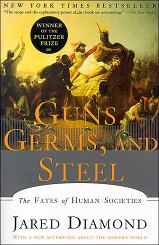
Guns, Germs and Steel
Jared Diamond
480 pages, including index
published in 1999
Guns, Germs and Steel was written to provide an answer to an old question: how come it was Europe (and its descendants in America) that has ended up ruling the world in the 20th century? Why not some empire from Asia or Africa or the Americas? What made Europe and the United States so unique?
For a long time the answer to that question has been simple of course: the innate superiority of the White Race ensured its eventual dominance of the Earth. That theory has been somewhat discredited in the last half century or so, and as Diamond reports from his own experiences, it's just not true that Europeans are smarter or cleverer than other peoples and hence more capable of conquering other countries, so something else must be going on.
Diamond looks at some other theories to explain this issue, such as the protestant work ethic, the existence of various more or less equal competing states, a tradition of inventiveness and scientific research etc, but all these theories have in common that they don't explain anything but just move the difficulties one step back. The question then becomes why did this work ethic, those competing states, this scientific traditions arouse in Europe rather than elsewhere. In other words, you need to explain what made Europe different from other continents by examing the root causes of this difference. What made Europe able to conquer the Americas instead of the other way around is that Europe had guns, germs and steel and the American empires had not: what were the root causes of this difference is the question Diamond tries to answer here.
The answer Guns, Germs and Steel gives is rooted in geography and environment. European supremacy was determined not by the innate superiority of Europeans, but because they lived in a continent which boasted the largest amount of domesticable animals and staple foods. The geography of Europe made it hard for one empire to conquer it all, leading to several competiting states stimulating development, but at the same time it's east-west orientation made it easier for domesticated plants and animals to spread, because it presents similar climatic, geographic, and disease conditions to migrants and no insuperable barriers. The last factor in the rise of Europe is that its dense, well interconnected population of both people and domestic animals lead to adaptation to dangerous diseases, which the Americas lacked: hence European smallpox destroying indigenous American populations far more than simular diseases did the Europeans.
The majority of Guns, Germs and Steel is spent in supporting the thesis I've sketched in the above paragraph. Whether you agree with this thesis or not, it's still quite interesting in the broad sweep of history Diamond documents. For myself, I did find his thesis convincing, though I'm still skeptical it's the whole truth. What's more, on this reread I managed to crystallise an objection that had only been vague when I first read this, back in 2000 or so.
That objection being that Diamond treats history as if the current state of the world is the end of history, as if history is a race with winners and losers and whoever is ahead in 1999 is the winner. But history has not ended and the current domination of European and European descendant societies may very well be a temporary aberration: if we could look 500 years in the future, who may then be the rulers of the world?
Looking back at the past as well, Diamond treats the rise of Europe as inevitable due to the advantages it enjoyed. Yet Europe was nowhere near dominating the planet until quite recently, only really starting to in the second half of the nineteenth century, though the trend was visible before that of course. However if history could be restarted from 1500 CE again, would Europe again end up as victor? According to Diamond it must, yet as we've seen with Japan in the nineteenth century, the advantages Europe enjoyed could be negated relatively easily, to the point at which it could defeat a major European power after some fifty years of "catch-up".
Does this complaint negate the value of Guns, Germs and Steel? Not for me. It did what it set out to do, provide a coherent case for how Europe ended up dominating the world, if only temporarily, in a way that made sense and may very well be part of the truth, if not the truth.
Read more about:
Jared Diamond,
Guns, Germs and Steel,
science,
book review